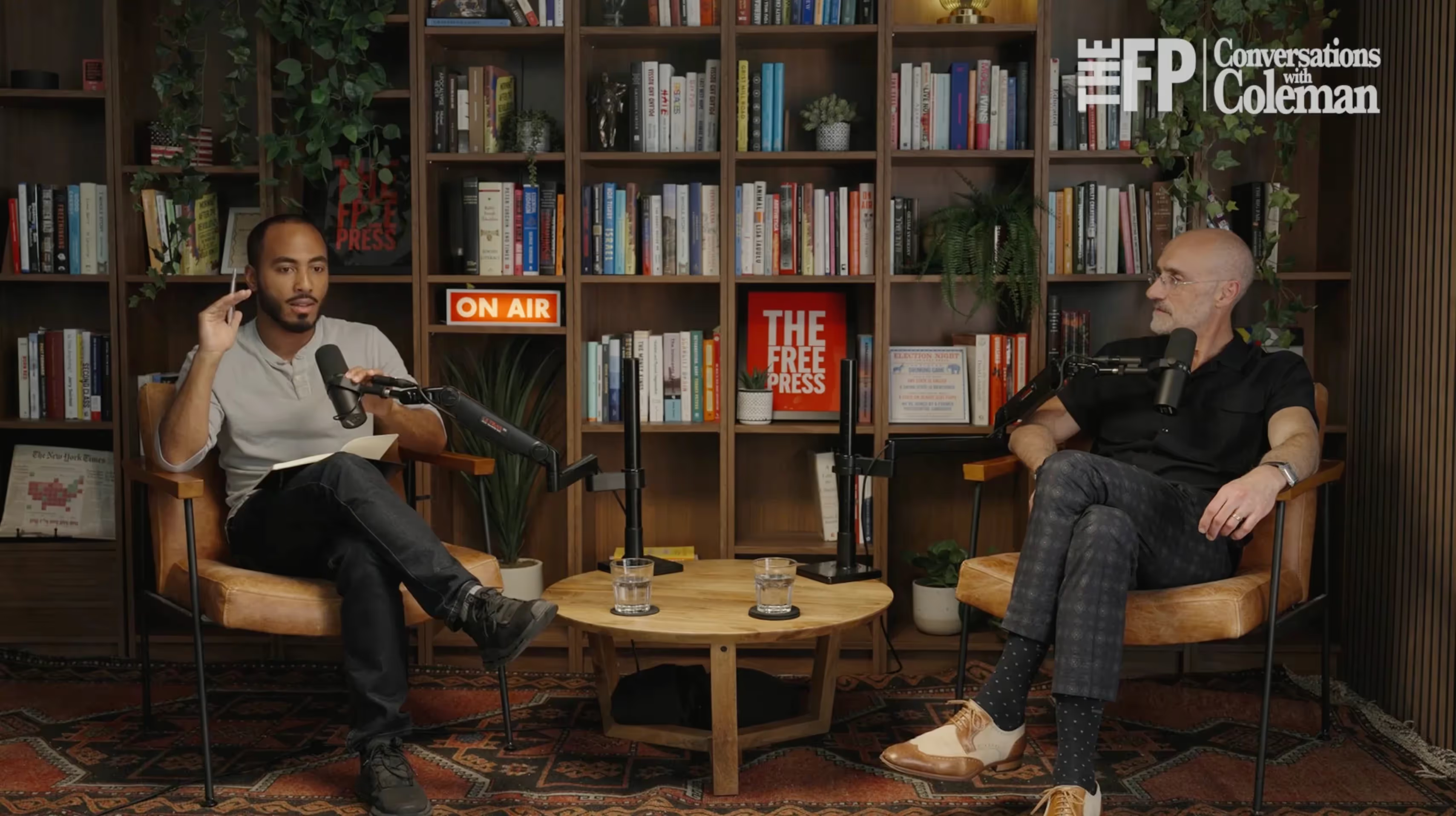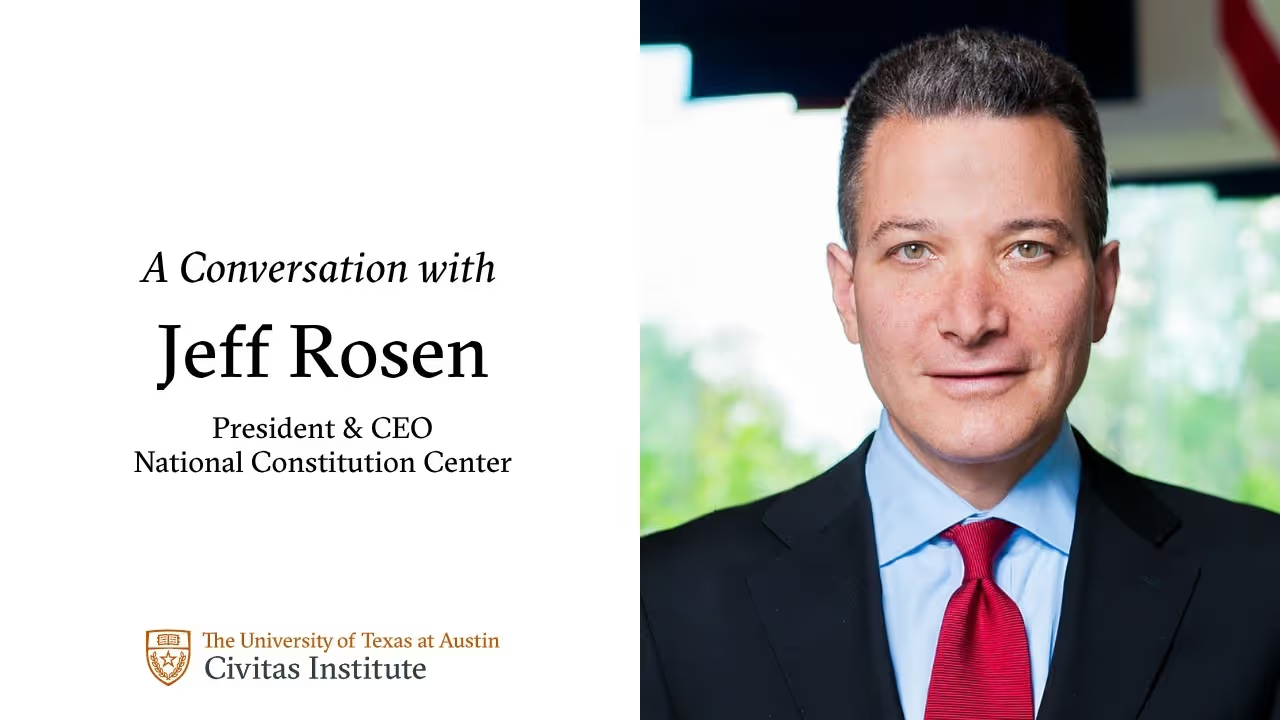
National Poll from Civitas Institute: Americans Concerned About AI, Economic Issues
The Civitas Institute Poll, conducted from March 11-20, 2025, asked 1,200 Americans an array of questions about how things are going in the country, their attitudes towards the functioning of core democratic and economic institutions, how they feel about artificial intelligence (AI), and what they know about different people and groups in the United States.
Here are the top four take-aways…
Download the executive memo, topline results, and crosstabs for this Civitas Institute poll.
Number 1: Americans are worried about our new robot overlords.
While 27% of respondents say they are positive towards AI, 43% say that they are negative ands 27% say they are neutral. There is an age divide with respect to AI opinions, as people under 30 years of age are relatively positive (37% positive, 31% negative, 27% neutral) whereas seniors are negative (17% positive, 50% negative, 27% neutral).
Sixty-one percent of Americans say they are either “somewhat” or “very” knowledgeable about AI, while 22% say they are somewhat or very unknowledgeable. Twenty-nine percent of respondents say they use AI often, compared to 30% who say they have used it not very often or rarely, and 36% who say they have never used it. Only 18% of those under 30 years of age say they have never used AI, while 56% of seniors have never used it.
When asked what makes them most nervous about AI, the top concern is “the human connection” (51% nervous, with 25% saying they are “very” nervous), followed by what it means for education (46% nervous, 18% very nervous), losing their job (43% nervous, 17% very nervous), civility (37% nervous, 19% very nervous), healthcare (33% nervous, 16% very nervous), and global economic competitiveness (30% nervous, 13% very nervous).
Just under half of our respondents say they would support increased federal governmental regulations of AI (46%), while 21% want to keep regulations as they are, and 5% want to decrease regulations. Over a quarter of Americans say they don’t know whether the U.S. government should enact more or less regulation. While Democrats are more likely than independents or Republicans to support increased regulation, it is the plurality response among all partisans—even among Republicans, 40% support increased federal regulation of AI compared to 8% who want less regulation.
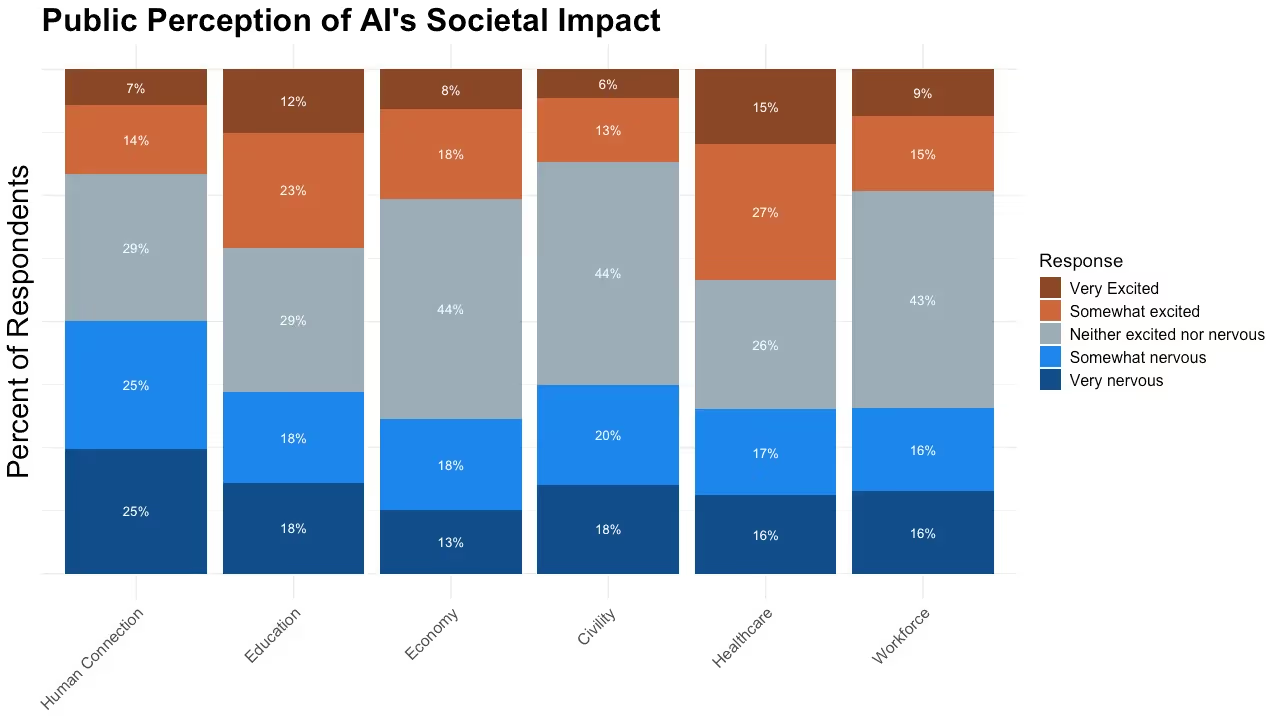
Number 2: Economic issues dominate voters’ concerns.
Voters are singing the same song they have been singing for three years now: economic issues easily top the list of important issues facing the country. Three of the top five issues are purely economic in nature: at the head of the list is inflation/prices (74% rate this issue as “extremely important”), followed by health care (71%), social security (67%), jobs/employment (61%), and taxes (60%).
Beyond these issues, the net five include crime (60% extremely important), education (58%), gun violence (52%), eligible people being prevented from voting (51%), and immigration (49%).
There are predictable partisan differences on issues such as immigration (68% of Republicans rate it as extremely important compared to 37% of Democrats) and abortion (22% of Republicans say it is extremely important compared to 64% of Democrats). But both sides are in agreement about the primacy of economic issues.
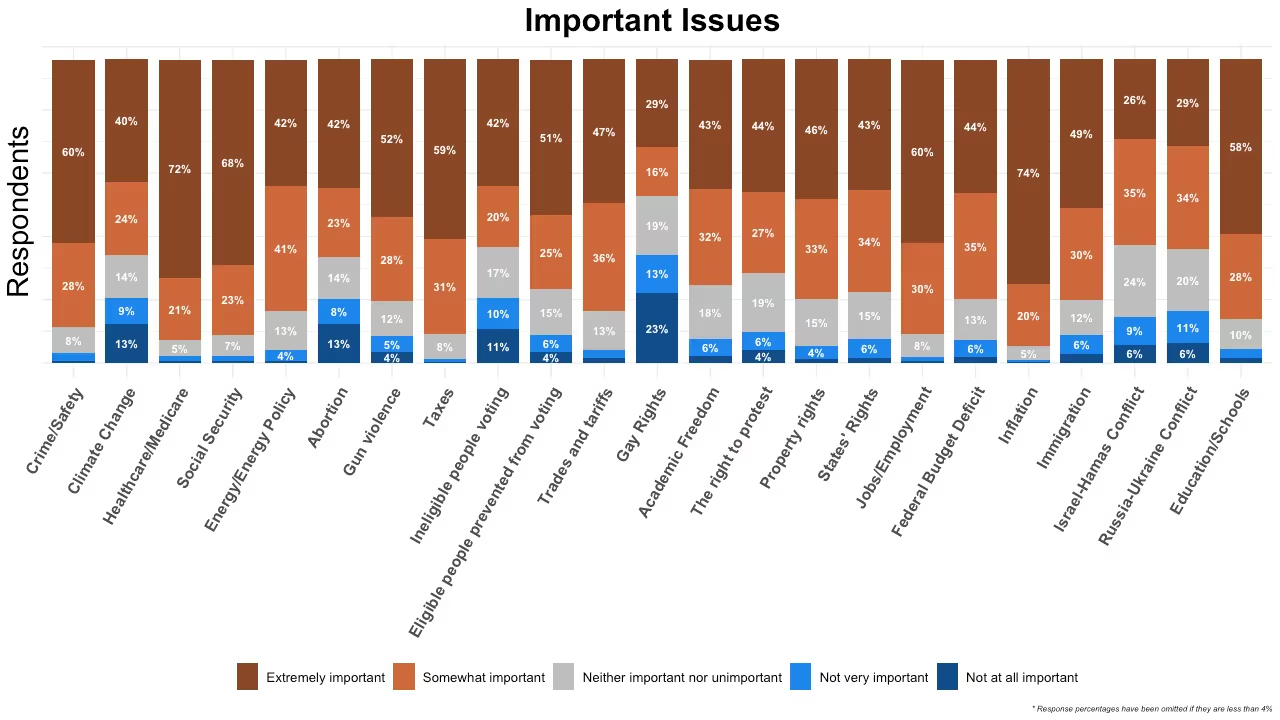
Number 3: Less than half rate democratic or capitalist functioning positively.
When asked to rate the way democracy is working in the U.S. today, 38% offer a positive response compared to 45% who give it a negative response (11% rate it as neither good nor bad). There is a marked disparity in intensity as well, with 19% rating our democratic functioning as “terrible” and 5% rating it as “excellent.”
While disturbing, there is an obvious partisan structure to the responses. More than half (56%) of Democrats give our democracy negative ratings, with almost one-third (32%) saying it is “terrible.” By comparison, 64% of Republicans give it a positive rating and only 21% rate it negatively. Among independents, 33% are positive and 49% are negative.
Overall, 42% say U.S. democracy is a good example for the world compared to 33% who say it is a bad example. By 20 points, Democrats say it is a bad example (50% good, 30% bad) while by 55 points Republicans say it is a good example (66% good, 11% bad).
Our economic system—private investment and ownership of business—garners somewhat more positive marks, with 43% giving positive evaluations and 25% negative response.
Curiously, the margin between good example and bad example is smaller for our economic system than for our democracy: our democracy is +9 whereas our economic system is a mere +6 (41% good example, 35% bad example). Democrats (-27 good/bad), those under 30 years of age (-2), and women (-8) are driving the less positive numbers here.

Number 4: Americans think we need science and expertise, but many have faith in the wisdom of common folk.
There has been a great deal of chatter in recent months about the prominence of populist attitudes among the American public. Part of this chatter centers on the extent to which the public is mistrustful of experts and scientists. We asked people four separate questions in agree-disagree format about the relevance of scientific expertise, the wisdom of ordinary people, and whether the system is stacked against regular people.
The data indicate that scientific expertise is still important. By 62 points, people agree with the idea that ordinary people can really use the help of experts to understand complicated things like science and health. Furthermore, they disagree—by 39 points—that when it comes to really important questions, scientific facts don’t help much.
What about the wisdom of ordinary people? When pitted against experts and intellectuals, ordinary people lose out only by about 10 points. Party matters on this item. Republicans profess the most faith in the common man, preferring them to scientists and experts by about 22 points. Democrats, conversely, prefer scientists and experts by roughly 33 points.
Both sides, however, agree that the system is stacked against people like themselves. By 23 points, Americans agree with this statement. Racial and ethnic minorities feel this the most strongly, with Black people agreeing by a 46-point margin, Latinos by 37 points, and Asian people by 39 points.
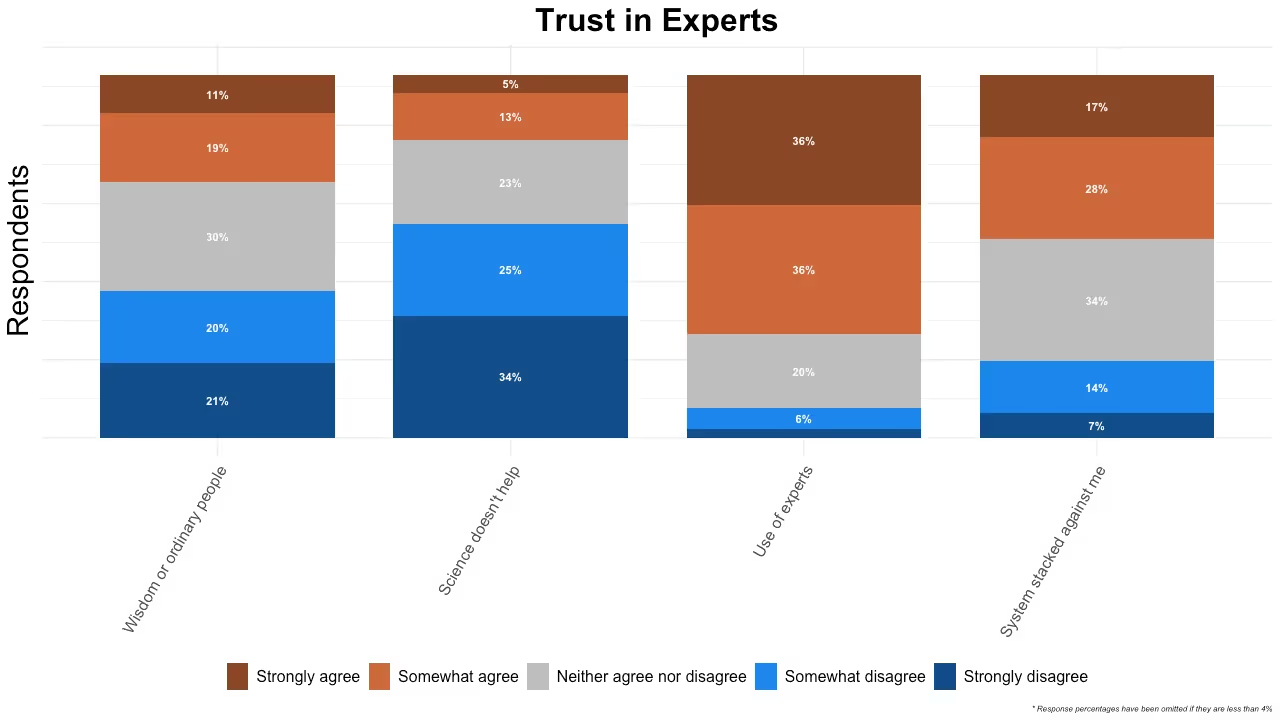
Methodology
From March 11-20, 2025, YouGov interviewed 1,279 registered voters who were then matched down to a sample of 1,200 to produce the final dataset. The respondents were matched to a sampling frame on gender, age, race, and education. The sampling frame is a politically representative "modeled frame" of U.S. registered voters, based upon the American Community Survey (ACS) public use microdata file, public voter file records, the 2023 Current Population Survey (CPS) Voting and Registration supplements, the 2024 National Election Pool (NEP) exit poll, and the 2024 CES surveys, including demographics and 2024 presidential vote.
The matched cases were weighted to the sampling frame using propensity scores. The matched cases and the frame were combined and a logistic regression was estimated for inclusion in the frame. The propensity score function included age, gender, race/ethnicity, years of education, and region. The propensity scores were grouped into deciles of the estimated propensity score in the frame and post-stratified according to these deciles.
The weights were then post-stratified on Party ID, 2024 presidential vote choice, followed by a four-way stratification of gender, age (4-categories), race (4-categories), and education (4-categories), to produce the final weight.
YouGov surveys are not probability samples, and therefore one cannot technically impute a margin of error. If one assumes that the sample approximates a probability sample on the matched variables, an estimated margin of error can be calculated. For a national sample of 1,200, this estimated margin of error (MoE) is approximately +/- 3.0 percentage points. The estimated MoE will be larger for sub-groups.
Download the executive memo, topline results, and crosstabs for this Civitas Institute poll.
Daron Shaw is a senior fellow at the Civitas Institute, as well as University Distinguished Teaching Professor and the Frank C. Erwin, Jr. Centennial Chair of State Government in the Department of Government at UT Austin.
Download PDF
View and download a PDF of the executive memo summarizing the Spring 2025 Civitas Poll.
Pursuit of Happiness

The Rise of Latino America
In The Rise of Latino America, Hernandez & Kotkin argue that Latinos, who are projected to become America’s largest ethnic group, are a dynamic force shaping the nation’s demographic, economic, and cultural future. Far from being a marginalized group defined by oppression, Latinos are integral to America’s story. They drive economic growth, cultural evolution, and workforce vitality. Challenges, however, including poverty, educational disparities, and restrictive policies, threaten their upward mobility. Policymakers who wish to harness Latino potential to ensure national prosperity and resilience should adopt policies that prioritize affordability, safety, and economic opportunity over ideological constraints.

Exodus: Affordability Crisis Sends Americans Packing From Big Cities
The first in a two-part series about the Great Dispersion of Americans across the country.
.jpg)
The False Equivalence of Multicultural Day
Parents have an affirmative obligation to reinforce patriotic values and counter the narratives that are taught in school.

Norman Podhoretz: American Patriot, Faithful Jew, and Indomitable Defender of Civilization
Podhoretz never turned on the promise of America.










